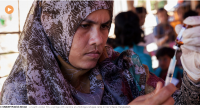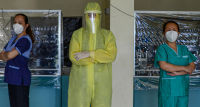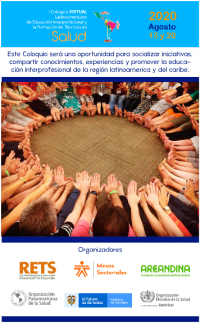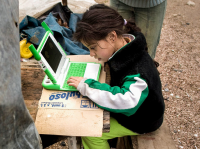You are here
News
-
11/25/2020 - Approximately once every minute and 40 seconds, a child or young person under the age of 20 was infected with HIV last year, the UN Children’s Fund (UNICEF) has reported, calling on governments to “protect, sustain and accelerate” efforts to combat childhood HIV.
-
11/16/2020 - Member States at the resumed virtual, 73rd World Health Assembly, recognizing the dedication and sacrifice of the millions of health and care workers at the forefront of the Covid-19 pandemic, unanimously designated 2021 as the International Year of Health and Care Workers (YHCW).
-
11/10/2020 - The UN is calling for authoritative scientific information and research to be made freely available, to accelerate research into an effective vaccine against the COVID-19 virus, help counter misinformation, and “unlock the full potential of science”.
-
10/30/2020 - Future pandemics will emerge more often, spread more rapidly, do more damage to the world economy and kill more people than COVID-19 unless there is a transformative change in the global approach to dealing with infectious diseases, warns a major new report on biodiversity and pandemics by 22 leading experts from around the world.
-
10/22/2020 - With countries and pharmaceutical companies around the world gearing up to distribute COVID-19 vaccines following trials, the UN Children’s Fund UNICEF has begun laying the groundwork for the rapid, safe and efficient delivery by buying and pre-positioning syringes and other necessary equipment. To begin preparations, this year, UNICEF will stockpile 520 million syringes in its warehouses, part of a larger plan to have a billion syringes ready for use through 2021, to guarantee initial supply and help ensure that syringes arrive before vaccines are distributed.
-
09/21/2020 - COVID-19 has reminded the world of the vital role health workers play in relieving suffering and saving lives, the UN World Health Organization (WHO) has said, underlining the need to ensure their safety and protection.
-
09/12/2020 - On the 13th and 20th of August, from 4pm to 7pm (Brasilia time), the 1st Latin American Colloquium on Interprofessional Education and the training of Health Technicians was held. The event, which would take place in May in Colombia, ended up taking place digitally, in two sessions, due to the Covid-19 pandemic. The Colloquium, coordinated by the National Apprenticeship Service of Colombia (SENA), and by the Executive Secretariat of the International Health Technicians Education Network (RETS), supported by the Colombian Ministry of Health, the Pan American Health Organization (PAHO/WHO) and the Fundação Universitaria da Área Andina (Areandina). The Colloquium, for which almost 1,000 participants from various countries in the region signed up, had the following objectives: socializing initiatives from the Latin American and Caribbean region in interprofessional education (IPE); share knowledge and experiences of incorporating health technicians in the IPE; promote the implementation of national interprofessional education plans (IPE); and making technical education visible and strengthening in the development of the implementation of national IPE plans.
-
08/25/2020 - Investing in a mechanism that will guarantee all countries have fair and timely access to a COVID-19 vaccine is the only way out of the global pandemic, the head of the World Health Organization (WHO) said on Monday (24/08).
-
08/20/2020 - Countries in the Americas should expand and invest in mental health services to cope with the effects of the COVID-19 pandemic, Pan American Health Organization Director Carissa F. Etienne said on August, 18.. “The COVID-19 pandemic has caused a mental health crisis in our region at a scale we’ve never seen before. It’s a perfect storm in every country, as we see growing needs and reduced resources to address them. It is urgent that mental health support is considered a critical component of the pandemic response,” she said.
-
08/10/2020 - On June 29th, when some 250,000 students returned to classrooms in Montevideo, Uruguay reached a post-COVID-19 normalization milestone that is still a distant aspiration for most of Latin America. While the virus still rages on throughout the Americas, Uruguay’s daily count of new cases had been in the single digit for most days since May, despite the recent incipient outbreaks. And what is most amazing: Uruguay, the country with the highest percentage of population over 65 years old, which is the age group most at risk from the pandemic, did it without a mandatory lockdown. What made Uruguay, up to now, so successful in containing the epidemic? And what can other countries learn from its experience?










